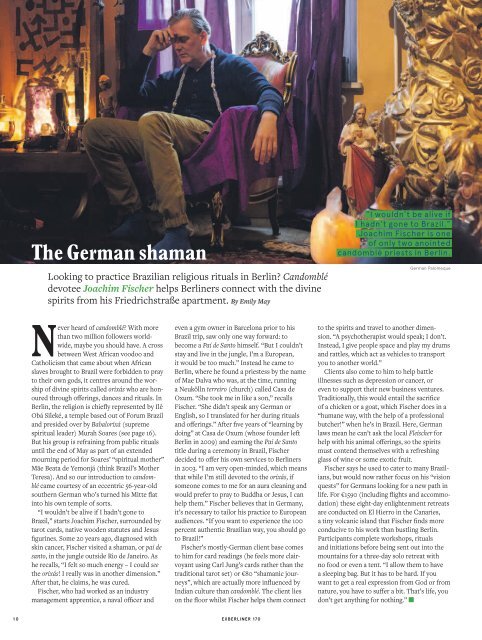EXBERLINER Issue 170, April 2018
Create successful ePaper yourself
Turn your PDF publications into a flip-book with our unique Google optimized e-Paper software.
The German shaman<br />
Looking to practice Brazilian religious rituals in Berlin? Candomblé<br />
devotee Joachim Fischer helps Berliners connect with the divine<br />
spirits from his Friedrichstraße apartment. By Emily May<br />
“I wouldn’t be alive if<br />
I hadn’t gone to Brazil.”<br />
Joachim Fischer is one<br />
of only two anointed<br />
candomblé priests in Berlin.<br />
German Palomeque<br />
Never heard of candomblé? With more<br />
than two million followers worldwide,<br />
maybe you should have. A cross<br />
between West African voodoo and<br />
Catholicism that came about when African<br />
slaves brought to Brazil were forbidden to pray<br />
to their own gods, it centres around the worship<br />
of divine spirits called orixás who are honoured<br />
through offerings, dances and rituals. In<br />
Berlin, the religion is chiefly represented by Ilê<br />
Obá Sileké, a temple based out of Forum Brazil<br />
and presided over by Babalorixá (supreme<br />
spiritual leader) Murah Soares (see page 16).<br />
But his group is refraining from public rituals<br />
until the end of May as part of an extended<br />
mourning period for Soares’ “spiritual mother”<br />
Mãe Beata de Yemonjá (think Brazil’s Mother<br />
Teresa). And so our introduction to candomblé<br />
came courtesy of an eccentric 56-year-old<br />
southern German who’s turned his Mitte flat<br />
into his own temple of sorts.<br />
“I wouldn’t be alive if I hadn’t gone to<br />
Brazil,” starts Joachim Fischer, surrounded by<br />
tarot cards, native wooden statutes and Jesus<br />
figurines. Some 20 years ago, diagnosed with<br />
skin cancer, Fischer visited a shaman, or pai de<br />
santo, in the jungle outside Rio de Janeiro. As<br />
he recalls, “I felt so much energy – I could see<br />
the orixás! I really was in another dimension.”<br />
After that, he claims, he was cured.<br />
Fischer, who had worked as an industry<br />
management apprentice, a naval officer and<br />
even a gym owner in Barcelona prior to his<br />
Brazil trip, saw only one way forward: to<br />
become a Pai de Santo himself. “But I couldn’t<br />
stay and live in the jungle, I’m a European,<br />
it would be too much.” Instead he came to<br />
Berlin, where he found a priestess by the name<br />
of Mae Dalva who was, at the time, running<br />
a Neukölln terreiro (church) called Casa de<br />
Oxum. “She took me in like a son,” recalls<br />
Fischer. “She didn’t speak any German or<br />
English, so I translated for her during rituals<br />
and offerings.” After five years of “learning by<br />
doing” at Casa de Oxum (whose founder left<br />
Berlin in 2009) and earning the Pai de Santo<br />
title during a ceremony in Brazil, Fischer<br />
decided to offer his own services to Berliners<br />
in 2003. “I am very open-minded, which means<br />
that while I’m still devoted to the orixás, if<br />
someone comes to me for an aura cleaning and<br />
would prefer to pray to Buddha or Jesus, I can<br />
help them.” Fischer believes that in Germany,<br />
it’s necessary to tailor his practice to European<br />
audiences. “If you want to experience the 100<br />
percent authentic Brazilian way, you should go<br />
to Brazil!”<br />
Fischer’s mostly-German client base comes<br />
to him for card readings (he feels more clairvoyant<br />
using Carl Jung’s cards rather than the<br />
traditional tarot set) or €80 “shamanic journeys”,<br />
which are actually more influenced by<br />
Indian culture than candomblé. The client lies<br />
on the floor whilst Fischer helps them connect<br />
to the spirits and travel to another dimension.<br />
“A psychotherapist would speak; I don’t.<br />
Instead, I give people space and play my drums<br />
and rattles, which act as vehicles to transport<br />
you to another world.”<br />
Clients also come to him to help battle<br />
illnesses such as depression or cancer, or<br />
even to support their new business ventures.<br />
Traditionally, this would entail the sacrifice<br />
of a chicken or a goat, which Fischer does in a<br />
“humane way, with the help of a professional<br />
butcher!” when he’s in Brazil. Here, German<br />
laws mean he can’t ask the local Fleischer for<br />
help with his animal offerings, so the spirits<br />
must contend themselves with a refreshing<br />
glass of wine or some exotic fruit.<br />
Fischer says he used to cater to many Brazilians,<br />
but would now rather focus on his “vision<br />
quests” for Germans looking for a new path in<br />
life. For €1590 (including flights and accommodation)<br />
these eight-day enlightenment retreats<br />
are conducted on El Hierro in the Canaries,<br />
a tiny volcanic island that Fischer finds more<br />
conducive to his work than bustling Berlin.<br />
Participants complete workshops, rituals<br />
and initiations before being sent out into the<br />
mountains for a three-day solo retreat with<br />
no food or even a tent. “I allow them to have<br />
a sleeping bag. But it has to be hard. If you<br />
want to get a real expression from God or from<br />
nature, you have to suffer a bit. That’s life, you<br />
don’t get anything for nothing.” n<br />
10 <strong>EXBERLINER</strong> <strong>170</strong>

















